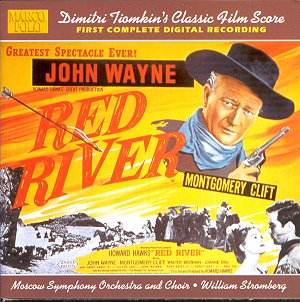I’ve
always had a fascination for unusual names, having one myself,
so I remember catching sight of Dimitri Tiomkin’s name on the
credits for "The High and the Mighty" when I saw that
film at the Regal, Golders Green, London in 1954. I never forgot
his name and always looked for it in the music credits of American
films. So it was that I got to know the names of Elmer Bernstein
("The Magnificent Seven"), Jerome Morross ("The
Big Country"), Miklos Rozsa ("Ben Hur"), Bernard
Herrmann ("Psycho"), and that stalwart of the ‘B’ picture
music scene, Mischa Baleinikov.
Film
music in general doesn’t work so well on its own no matter how
great its contribution to the picture because it mainly consists
of fragments illustrating specific actions in isolation from each
other. However, when a composer incorporates them into a suite
it can hold its own and there are many examples to prove this
is true, Prokofiev’s music for the films "Alexander Nevsky"
and "Ivan the Terrible", Shostakovich’s music for "Hamlet"
and Copland’s for "The Red Pony" to name but four. It
is music such as this that gives the lie to the oft-repeated calumny
that film music is inferior and its composers less competent,
than those who write solely for the concert hall. The above composers
plus people like Walton, Vaughan Williams, and Malcolm Arnold
show what a fallacy such claims are. And just listen to Miklos
Rozsa’s String Quartet that has a movement entitled "Modo
Ungharese", and you’ll discover, if you don’t know already,
how wonderful his music is, on or off the screen.
On
this question of unusual names it is interesting to note how many
composers for American films, had them, and that people such as
Jerome Morross, Adolph Deutsch ("High Sierra"), Max
Steiner ("The Treasure of the Sierra Madre"), Erich
Wolfgang Korngold ("The Adventures of Robin Hood"),
together with Herrmann, Rozsa, Copland and Bernstein, were from
Central and Eastern European (and often Jewish) origin. Despite
their origins, however, they wrote music that has such a quintessentially
American flavour and indeed it was Copland who forged the path
towards the creation of a truly American sound, where his predecessors
like Templeton Strong, Chadwick and others had pursued the European
tradition.
This
CD, the first digital recording of the complete score of the music
for Howard Hawks’ 1948 film "Red River", is thoroughly
American in character. When a fellow Russian asked Tiomkin how
a Russian (actually he was born in the Ukraine) from the St. Petersburg
Conservatory could write music for a western, he replied "Did
Johann Strauss, when he wrote ‘The Blue Danube’, know how to swim?"
In fact Tiomkin’s secret was to write original music that sounded
like folk tunes, and he used this technique not only in "Red
River", but also in "High Noon", "Gunfight
at the OK Corral", "Friendly Persuasion, and "The
Alamo", a film that included the haunting song "The
Green Leaves of Summer". Tiomkin wrote music for all kinds
of films from "Dial ‘M’ for Murder" to "The fall
of the Roman Empire" and worked for Directors such as Alfred
Hitchcock, William Wyler, Frank Capra and Stanley Kramer, and
received Oscars for his music for "High Noon", "The
High and the Mighty" and "The Old Man and the Sea".
The
story of "Red River" has its roots in a true story of
a vast cattle drive along the famous Chisholm Trail, and the growing
and changing relationship between Thomas Dunson (John Wayne) and
Matthew Garth (Montgomery Clift). The Main Title introduces Tiomkin’s
‘folk tune’ "Settle Down" which he uses throughout the
score to underpin the action, and to provide a "musical home"
to return to, together with creating a sense of calm, after periods
of high tension. Helping to establish the illusion that this is
a tune rooted in folk history he cleverly weaves into this musical
fabric references to such well-known and genuine folk songs as
"Deep in the heart of Texas", "She’ll be comin’
round the mountain when she comes" and "Oh, Susannah".
The music Tiomkin wrote for this film lasts over an hour, which
is substantial in a film which runs for 145 minutes, and is an
integral part of it, helping to create the atmosphere as surely
as the actors themselves do. Just listen to "Stampede"
to hear how this master of the media paints a kaleidoscopic musical
picture of the chaos that occurs when thousands of cattle run
amok. The music for this film is exhilarating, sentimental, full
of thrilling moments that build up the tension and then let the
audience drift back to a sense of well-being where problems have
been resolved, if only for a short time.
Marco
Polo have done a wonderful service in ensuring that such a brilliant
score has been fully restored and recorded, and they have released
many other discs of film music by Arnold, Herrmann, Korngold,
Steiner, Waxman, Young and others, and are to be congratulated
for doing so. Having said that I also have to say that in this
particular case the music doesn’t work away from the action of
the film for the precise reasons I mentioned at the outset, specifically
because the score represents no less than 37 separate "episodes",
and even the theme "Settle Down" cannot replace the
knitting together effected through the creation of a suite, a
process that can enmesh material so that the "joins"
are smoothed away. This in no way lessens the effect of this dynamic
and powerful score in its proper context but on disc it does limit
its appeal to those film music buffs among us which is a shame,
as musically it deserves a greater audience than it will likely
receive.
Steve
Arloff
see
also double review by Ian
Lace and Gary
Dalkin
